- Home
- Tad Williams
Lightspeed Issue 33
Lightspeed Issue 33 Read online
Lightspeed Magazine
Issue 33, February 2013
Table of Contents
Editorial, February 2013
The Happiest Dead Boy in the World—Tad Williams (ebook-exclusive)
The Best of All Possible Worlds—Karen Lord (novel excerpt)
Interview: Steven Erikson
Interview: Lois McMaster Bujold
Artist Gallery: Yannick De Smet (a/k/a Norke)
Artist Spotlight: Yannick De Smet (a/k/a Norke)
Article: Hat Tip to the Masters: Homage in Science Fiction—Jamie Todd Rubin (ebook-exclusive)
The Infill Trait—C.C. Finlay (SF)
Eight Episodes—Robert Reed (SF)
PauseTime—Mary Soon Lee (SF)
Harry and Marlowe Escape the Mechanical Siege of Paris—Carrie Vaughn (SF)
Prolegomenon to the Adventures of Chílde Phoenix—Marly Youmans (fantasy)
Abyssus Abyssum Invocat—Genevieve Valentine (fantasy)
The Herons of Mer de l’Ouest—M. Bennardo (fantasy)
Exogamy—John Crowley (fantasy)
Author Spotlight: Tad Williams (ebook-exclusive)
Author Spotlight: C.C. Finlay
Author Spotlight: Robert Reed
Author Spotlight: Mary Soon Lee
Author Spotlight: Carrie Vaughn
Author Spotlight: Marly Youmans
Author Spotlight: Genevieve Valentine
Author Spotlight: M. Bennardo
Author Spotlight: John Crowley
Coming Attractions
© 2013, Lightspeed Magazine
Cover Art and artist gallery images by Yannick De Smet (a/k/a Norke).
Ebook design by Neil Clarke.
www.lightspeedmagazine.com
Editorial, February 2013
John Joseph Adams
Welcome to issue thirty-three of Lightspeed!
Sometime in early February, we hope to have our custom-built ebook store launched and ready to take orders on lightspeedmagazine.com. This will replace our current ecommerce software, which has been giving us some trouble the last several months. But the big news is that Lightspeed will now offer direct subscriptions as well. So in addition to being able to subscribe via Amazon and Weightless Books, you’ll now also be able to subscribe directly from us. As always, you can go to lightspeedmagazine.com/subscribe to see all of our subscription options.
In case you missed the news last month, just a reminder that the nomination period for the 2012 Hugo Awards is now open. The 2012 Hugo Awards will be presented in San Antonio, TX during LoneStarCon 3, the 71st World Science Fiction Convention (Aug. 29-Sep. 2). Nominations close on March 10, 2012. Anyone who has a supporting or full membership of LoneStarCon 3 as of January 31, 2013 and all members of Chicon 7 (last year’s Worldcon) may nominate works. If you didn’t attend Chicon 7, and you don’t plan to attend LoneStarCon 3, you can still nominate by purchasing a supporting membership. Nominations may be submitted through the online ballot at lonestarcon3.org/hugo-awards.
If you’d like to reference a list of all Lightspeed stories (and other material published by yours truly in 2012), visit my personal website at johnjosephadams.com/blog. There, I’ve sorted everything into their proper categories (short story vs. novelette, etc.), including material from my 2012 original anthologies, Armored and Under the Moons of Mars.
Also, if you are planning and eligible to vote for the Hugos this year, you’re eligible for some free stuff! Just visit johnjosephadams.com/blog for details.
And just one more thing before we get to this month’s stories. I wanted to briefly mention some staff changes we’ve had at Lightspeed.
Late last year, we said goodbye to two of our long-time staffers: assistant editor Erin Stocks and editorial assistant Jennifer Konieczny. Replacing Erin is one of Lightspeed’s original assistant editors, Christie Yant, and we’ve uplifted one of our slush readers, Earnie Sotirokos, to take over for Jennifer. So salutations to Erin and Jennifer for their years of service, and a hearty welcome to Earnie and a hearty welcome back to Christie.
Another new hire is Rich Horton, whose name you might recognize as the editor of The Year’s Best Science Fiction & Fantasy series published by Prime Books. Finding the reprints we run in the magazine every month is a lot of work, so we’ve brought Rich on board as our reprint editor to assist me in that endeavor. Working with him behind the scenes has been great so far, and I think our readers will enjoy the magazine even more thanks to his contributions.
That about does it for staff changes. If you want to learn more about any of these folks, or any of the rest of our staff, you can always visit our Staff page at lightspeedmagazine.com/about/our-staff. But in any case, I hope you’ll join me in welcoming our new staffers and thanking our former employees for their dedication and service … not to mention all of the hard-working diligent folks who are neither “new” nor “former” and are simply “current”!
With all that out of the way, here’s what we’ve got on tap this month:
We have original science fiction by C.C. Finlay (“The Infill Trait”) and Carrie Vaughn (“Harry and Marlowe Escape the Mechanical Siege of Paris”), and SF reprints by Robert Reed (“Eight Episodes”) and Maureen F. McHugh (“Interview: On Any Given Day”).
Plus, we have original fantasy by Genevieve Valentine (“Abyssus Abyssum Invocat”) and M. Bennardo (“The Herons of Mer de l’Ouest”), along with fantasy reprints by Marly Youmans (“Prologomenon to the Adventures of Chílde Phoenix”) and John Crowley (“Exogamy”).
We also have our usual assortment of author and artist spotlights, and feature interviews with bestselling authors Lois McMaster Bujold and Steven Erikson. And for our ebook readers, our ebook-exclusive content this month is: the novella “The Happiest Dead Boy in the World” by Tad Williams; an excerpt of the new novel The Best of All Possible Worlds by Karen Lord; and a special feature article by Jamie Todd Rubin, “Hat Tip to the Masters: Homage in Science Fiction.”
Our issue this month is again sponsored by our friends at Orbit Books. This month, look for Fade to Black by Francis Knight. You can find more from Orbit—including digital short fiction and monthly ebook deals—at www.orbitbooks.net.
It’s another great issue, so be sure to check it out. And remember, there are several ways you can sign up to be notified of new Lightspeed content:
Newsletter: lightspeedmagazine.com/newsletter
RSS Feed: lightspeedmagazine.com/rss-2
Podcast Feed: lightspeedmagazine.com/itunes-rss
Twitter: @lightspeedmag
Facebook: facebook.com/lightspeedmagazine
Google+: plus.google.com/100415462108153087624
Subscribe: lightspeedmagazine.com/subscribe
Well, that’s all there is to report this month. Thanks for reading!
John Joseph Adams, in addition to serving as publisher and editor of Lightspeed, is the bestselling editor of many anthologies, such as The Mad Scientist’s Guide to World Domination, Oz Reimagined, Epic: Legends of Fantasy, Other Worlds Than These, Armored, Under the Moons of Mars: New Adventures on Barsoom, Brave New Worlds, Wastelands, The Living Dead, The Living Dead 2, By Blood We Live, Federations, The Improbable Adventures of Sherlock Holmes, and The Way of the Wizard. He is a four-time finalist for the Hugo Award and the World Fantasy Award. He is also the editor of Nightmare Magazine and is the co-host of Wired.com’s The Geek’s Guide to the Galaxy podcast. Find him on Twitter @johnjosephadams.
Tad Williams
Tharagorn the Ranger was deep in conversation with Elrond Half-elven in the quiet shadows of Rivendell’s Hall of Fire. The man of the west had just returned from roaming through the world, and he and the elven lord had not spoken together in a long time. Things of moment were in their minds, not least of which a sudden rash of goblin raids near the Misty Mountains. Thus it was that the elven messenger, with the graceful diffidence of his kind, waited for some long moments in the doorway before either of them noticed him.
“A visitor is here who wishes to speak to Tharagorn,” the elf replied to Elrond’s question. “He seems to be a halfling.”
“Yeah, that would be me.” The voice was louder and, it had to be said, a bit less cultured than what was normally to be heard in the house of the great elven lord. The figure in the doorway was half the size of anyone else present, his feet covered in hair so thick and matted he appeared to be standing ankle-deep in the corpses of two small mountain goats. “Bongo Fluffernutter, at your service,” he said with a sweeping bow. “Nice place you got here, Elrond. Love the old-world craftsmanship. Tharagorn, can you spare a second?”
“Oh, for God’s sake, Beezle,” the ranger said under his breath. “I am truly sorry,” he told the master of the house. “Will you excuse me for a moment?”
“Of course.” Elrond looked a little puzzled, although the simulation was adept at incorporating or simply ignoring anomalies. “Is it really a halfling? We have not seen such a one, I think, since Gandalf brought his friend Bilbo Baggins to us from the Shire some years ago.”
“Yes, well, this … this is a different sort of hobbit.” Tharagorn lowered his voice. “A less successful branch of the species, if you get my drift.”
“Hey! I heard that!”
Elrond and the messenger withdrew, leaving Tharagorn, also known as Orlando Gardiner, alone in the high-raftered hall with his small, shabby visitor.
“Beezle, what the hell are you doing?”
“Don’t blame me, boss, you’re the one who said I couldn’t show up here unless I was in character.” He lifted a foot and admired it. “Whaddaya think? Nice pelt, huh?”
“Bongo Fluffernutter?”
“Isn’t that the kind of name they all have? Jeez, I’ve only got so much room for Tolkien trivia, y’know.”
Orlando stared at the pint-sized horror in front of him. Whether it was a better fit with the simulation than Beezle Bug’s normal, multi-legged, cartoonish appearance was open to debate, but there was no doubt he was looking at the world’s ugliest hobbit. Orlando was beginning to suspect the software agent’s sense of humor had moved on a bit beyond what was covered by the original warranty. Maybe he’d given Beezle a bit too much freedom over the years for self-programming off the net.
“I mean, really,” Beezle said, “look at which pot’s calling which kettle black, boss—Tharagorn? Tharagorn? Are you just waiting around here for the Return of the Thking or something?”
“Ha ha. Oh, you’re one funny piece of code. I picked it because it sounds like ‘Thargor.’” Who had been, of course, Orlando’s online avatar for most of his childhood, the brawny barbarian swordsman who had conquered so many gameworlds back in the old days, when Orlando Gardiner had still had a real world to return to at the end of the adventure. Not that he wasn’t a little embarrassed by it all now. “Look, I wanted something easy to remember. Do you know how many names I have on this network?” He realized that he was justifying himself to an entity that had once been a birthday present, and not even the most expensive present he had received that year. “What was it you wanted, anyway?”
“Just to do my job, boss.” Beezle actually sounded hurt. “I’m only serving as a furry-footed link to your busy social calendar. We already talked about dinner with your folks, so I know you remember that. You know you’ve got Fredericks scheduled in first, right?”
“Yeah. She’s meeting me here.”
“Oh, good, I’m sure that’ll be fun for everyone. May I recommend the Hall of Endless Nostalgic Singing? Or perhaps the Silvery Giggling Lounge?”
“Your sarcasm is noted.” It wasn’t as though Orlando didn’t harbor occasional less-than-reverent thoughts about the Tolkien world himself, but it was still the closest thing he had to a home, after all. Back in the beginning of his full-time life on the network, when Orlando had been overwhelmed by all that had happened to him, Middle Earth—and Rivendell in particular—had been a blessed haven for him, a familiar, much-loved place where he could relax and heal and come to terms with his responsibilities and even with the possibilities of immortality, a subject that surrounded him on every side in Elrond’s ancient residence.
“By the way, tonight’s also the first Friday of the month in Wodehouse World,” Beezle went on. “Did you remember that too?”
“Oh, fenfen. No, I forgot. How long do I have?”
“Meeting’s in about three hours.”
“Thanks. I’ll be there.” But Beezle just stood, waiting expectantly, forcing Orlando to ask, “What is it now?”
“Well, if I have to stay in character and walk out of this overgrown bed and breakfast and all the way across the bridge just so I can leave the simulation, you could at least say, ‘Fare thee well, Bongo Fluffernutter!’ or something.”
Orlando glowered. “You’re joking.”
“It’s only polite.”
“Fenfen.” But Beezle showed no signs of leaving without it. “Chizz, then. Fare thee well, Bongo Fluffernutter.”
“Don’t forget, ‘And may your toes grow ever more curly.’”
“Just get out of here.”
“Okay. Fare thee well, also, Tharagorn, Cuddler of Elves.”
It turned out Beezle could move quickly on those furry feet when he had to.
Sam Fredericks was almost an hour late, but that was all right: guests could get something to eat and drink at pretty much all hours in Rivendell if they didn’t mind the limited menu. The people who had programmed this simworld years ago—a team from the Netherlands, as Orlando had discovered—had stuck to the original very carefully. There was no specific mention in the books of meat being served in Imladris, the elven name for Elrond’s sumptuous house, so what the kitchen offered was pretty much limited to bread, honey, fruit, vegetables, and dairy products. Orlando, who had spent a lot of time in the Tolkien simulation during his early days living in the network, could remember more than a few times when he would have been willing to crawl to Mordor for some pepperoni.
When she showed up, she looked exactly the same as she had on her last visit, dressed in the manner of a male elf, her coffee-and-cream skin radiant, her frizzy hair a glorious confusion held only by a cloth band that made her look slightly piratical. She and Orlando hugged. Sam let go first.
“Something to eat?”
“I’m not really hungry,” she said. “You go ahead if you want to.”
“Sam, the food here won’t fill you up, and I don’t need to eat at all. It’s just social.” He led her onto one of the covered balconies instead. They could hear the river ringing in the valley below them, although the lanterns of Rivendell only illuminated the tops of the trees.
Sam slid onto a bench. Orlando sat down beside her and stretched his long legs. That was one of the holdovers from his illness that even he recognized: he was never going to be in a sick or crippled body again if he could avoid it. “So, you,” he asked. “Are you okay?”
“I’m fine. How are you?”
“Oh, you know. Getting around, keeping an eye on things. This whole job has turned out a lot different than I expected. When I first agreed to be the sort of head park ranger, I thought I’d be, I don’t know, stopping wars or something.”
Sam smiled. “Like Superman?”
“Or God, yeah. I try not to limit my ambitions.” He waited; Sam’s laugh was a little late. “But since Sellars and Kunohara convinced all the others to let the whole simiverse go free-range,
I’m kind of more like an anthropologist or something.” Patrick Sellars had brought together the group of people who had prevented the network from being used for its original purpose, which had been to give immortality within its confines to the Grail Brotherhood, a group of people as unpleasant as they were rich. Kunohara, a former minor member of the Grail who had changed sides, joined Sellars at the end in saving the network—and in essence, saving the lives of all the network’s complex sims, as well as Orlando himself, who had been copied into the network before his physical death and now existed only as information. Sellars, too, had soon after left his own dying body behind to take up existence on the Otherland network, but unlike Orlando, his move had been voluntary.
“Anthropologist?” Sam prompted.
“Yeah, well, except for fixing obvious code errors, which don’t happen much, I mostly make a lot of reports and keep an eye on the interesting, unexpected stuff. But since Sellars is gone now and Kunohara’s so majorly busy, I kind of wonder who I’m making reports for.”
“The rest of us, I guess. And other people who might study it someday.” Sam shrugged. “Do you miss him? Sellars?”
“Yeah. I can’t say we were utterly friends or anything. Not like you and me.” He hoped to see her smile, but she only nodded. “He was just too … something. Old. Smart. But I liked him a lot once I got to know him. And he was the only person who lived here with me, Sam. I knew he wasn’t going to be around forever—that he was tired, that he wanted to follow his information-people out into the great whatever. But I sort of thought we’d get to have him for a few more years.” He was playing it down, of course, for Sam’s benefit. It had been even more devastating than he had expected when Sellars moved on: Orlando had felt deserted, bereft. After all, the crippled ex-pilot had been the only other person in the universe truly to understand the strangeness of knowing you were alive only on a network, that your real body was ashes now, that most of the people who had known you thought you were dead … and were more or less right.
Also, Sellars had been a kind person, and—either because or in despite of his own suffering—a good listener. He had been one of the only people who ever saw Orlando Gardiner cry. That had been back in the earliest days of living on the network, of course. Orlando didn’t cry anymore. He didn’t have the time for things like that.

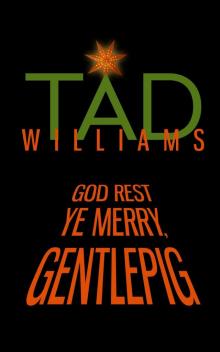 God Rest Ye Merry, Gentlepig
God Rest Ye Merry, Gentlepig Tailchaser's Song
Tailchaser's Song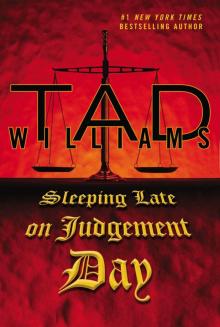 Sleeping Late on Judgement Day
Sleeping Late on Judgement Day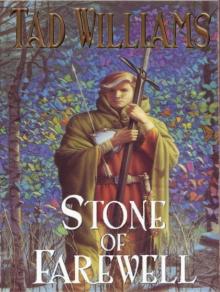 Stone of Farewell
Stone of Farewell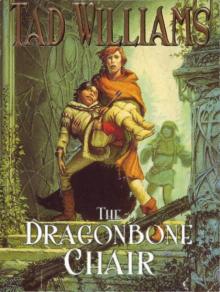 The Dragonbone Chair
The Dragonbone Chair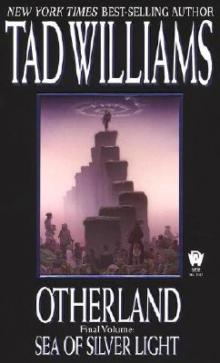 Sea of Silver Light
Sea of Silver Light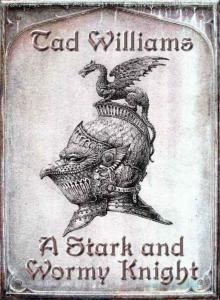 A Stark and Wormy Knight
A Stark and Wormy Knight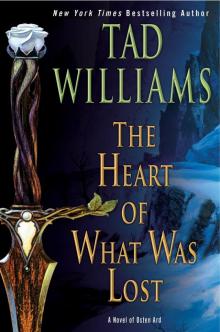 The Heart of What Was Lost
The Heart of What Was Lost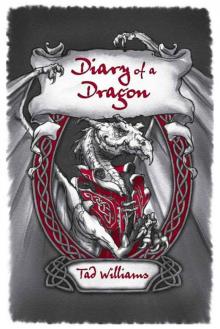 Diary of a Dragon
Diary of a Dragon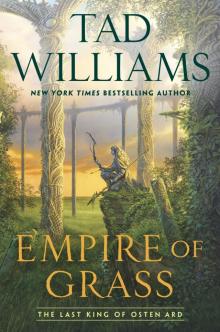 Last King of Osten Ard 02 - Empire of Grass
Last King of Osten Ard 02 - Empire of Grass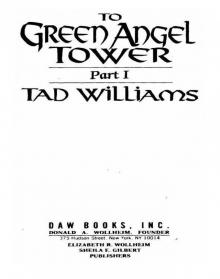 To Green Angel Tower, Volume 1
To Green Angel Tower, Volume 1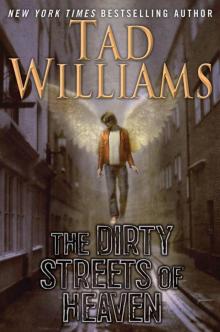 The Dirty Streets of Heaven
The Dirty Streets of Heaven River of Blue Fire
River of Blue Fire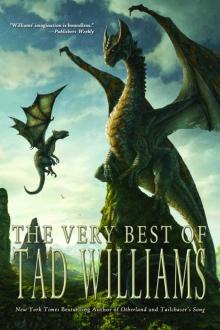 The Very Best of Tad Williams
The Very Best of Tad Williams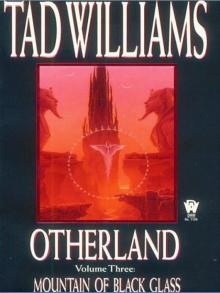 Mountain of Black Glass
Mountain of Black Glass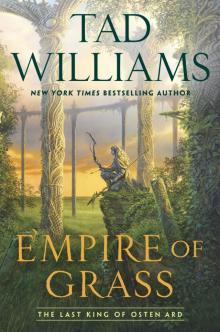 Empire of Grass
Empire of Grass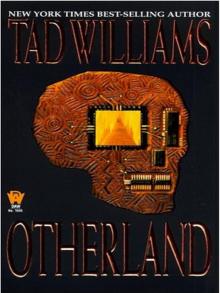 City of Golden Shadow
City of Golden Shadow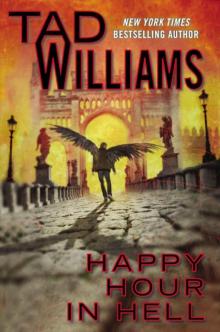 Happy Hour in Hell
Happy Hour in Hell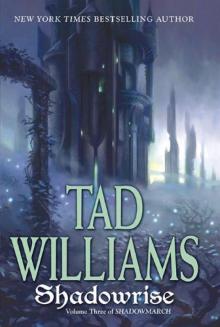 Shadowrise
Shadowrise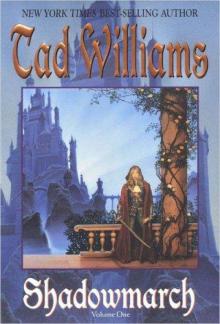 Shadowmarch
Shadowmarch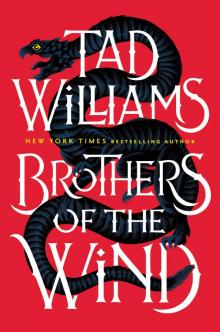 Brothers of the Wind
Brothers of the Wind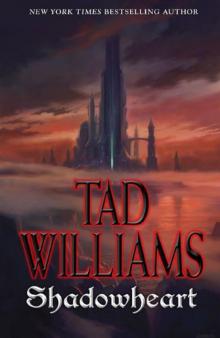 Shadowheart
Shadowheart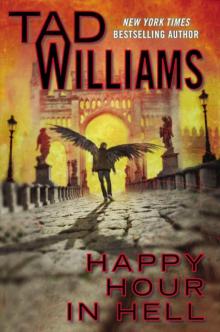 Bobby Dollar 02 - Happy Hour In Hell
Bobby Dollar 02 - Happy Hour In Hell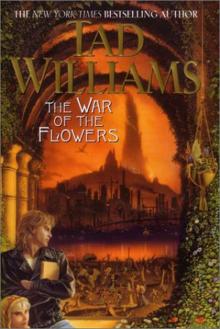 The War of the Flowers
The War of the Flowers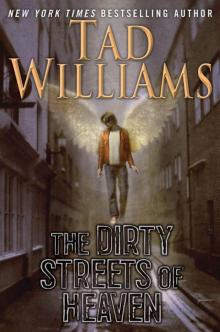 The Dirty Streets of Heaven bd-1
The Dirty Streets of Heaven bd-1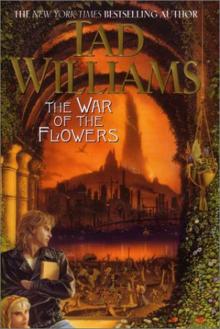 Tad Williams - The War of the Flowers (retail) (pdf)
Tad Williams - The War of the Flowers (retail) (pdf) Shadowheart s-4
Shadowheart s-4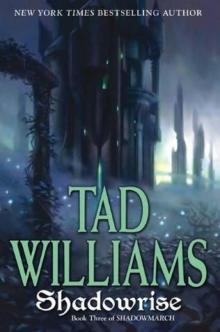 Shadowrise s-3
Shadowrise s-3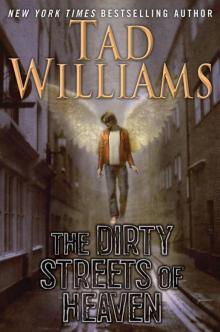 The Dirty Streets of Heaven: Volume One of Bobby Dollar
The Dirty Streets of Heaven: Volume One of Bobby Dollar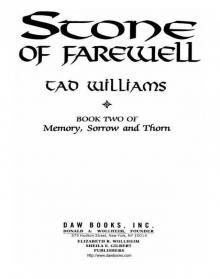 The Stone of Farewell
The Stone of Farewell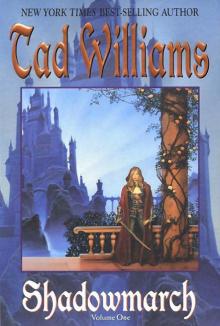 (Shadowmarch #1) Shadowmarch
(Shadowmarch #1) Shadowmarch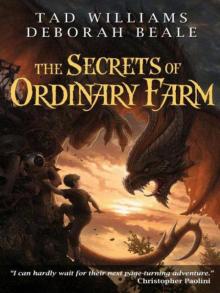 The Secrets of Ordinary Farm of-2
The Secrets of Ordinary Farm of-2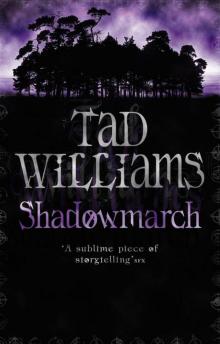 Shadowmarch s-1
Shadowmarch s-1![Bobby Dollar [04] God Rest Ye Merry, Gentlepig Read online](http://i1.bookreadfree.com/i1/04/06/bobby_dollar_04_god_rest_ye_merry_gentlepig_preview.jpg) Bobby Dollar [04] God Rest Ye Merry, Gentlepig
Bobby Dollar [04] God Rest Ye Merry, Gentlepig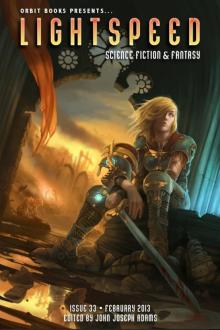 Lightspeed Issue 33
Lightspeed Issue 33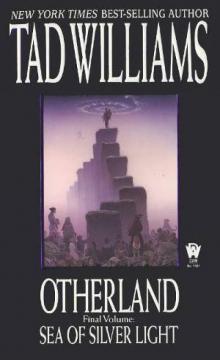 Sea of Silver Light o-4
Sea of Silver Light o-4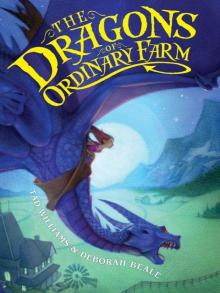 The Dragons of Ordinary Farm of-1
The Dragons of Ordinary Farm of-1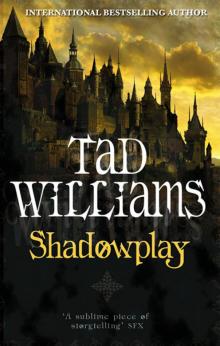 Shadowplay s-2
Shadowplay s-2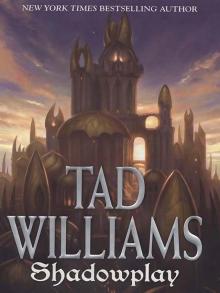 (Shadowmarch #2) Shadowplay
(Shadowmarch #2) Shadowplay